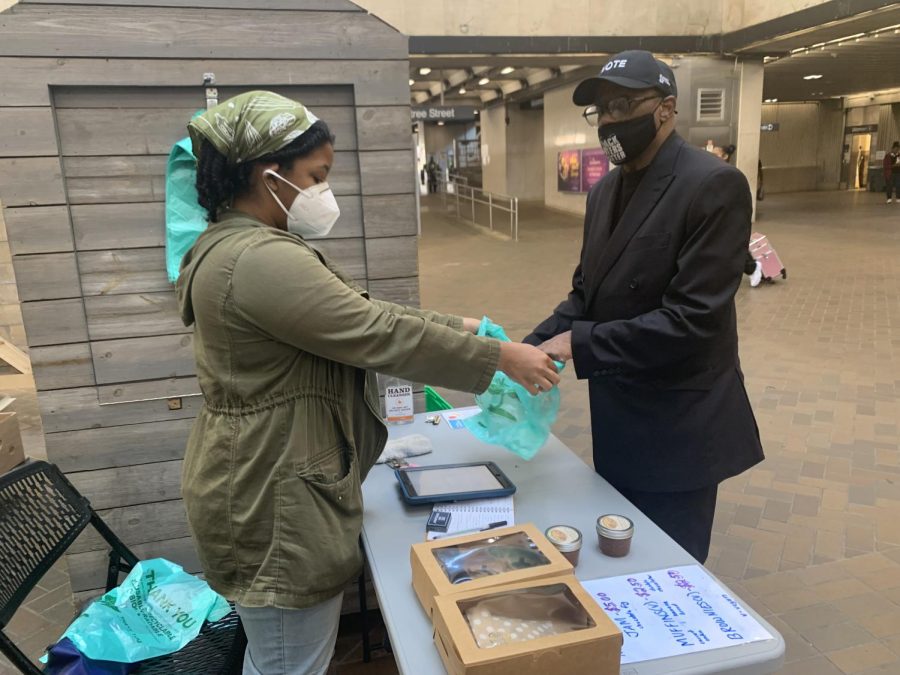MARTA Markets uniquely serve residents, pivot to outreach
Daijah Suggs, the Five Points MARTA Market manager, provides a bag for a customer in the checkout line of the market. The transfer point between all rail lines, Five Points is run by a variety of managing and community partners.
April 12, 2023
Launched in 2015, the MARTA Markets program aims to provide affordable, fresh food to low-access areas of Atlanta through food stands, and the markets operate through a partnership between MARTA and non-profit Community Farmers Markets (CFM).
Lauren Wood, director of MARTA Markets said Community Farmers Markets run the daily operations of the markets.
“MARTA owns the program, and they provide various administrative – infrastructure and operations-based support in a lot of different ways,” Wood said. “[They work] in terms of staffing the markets, sourcing the market, promoting the markets [and] doing outreach and education, and CFM [relies] on that work.”
Wood said that the markets are run by managing partners, Wholesome Wave Georgia, MARTA and CFM, with community partners including Urban Recipe, Atlanta Community Food Bank and Foodwell Alliance. While the managing partners administer the markets’ essential operations, the community partners handle the markets’ external benefits for customers.
“What we found is that food access encompasses much more than just physical proximity to fresh food; food access includes the knowledge and resources to prepare the food,” Wood said. “It means having access to food that you want to eat; we call that food that is culturally-relevant. Given that, our community partners and our fellow managing partners help us provide those services and that experience to our customers.”
Wood said that pairing public transit with fresh food access and local food-based organizations is unique to the city of Atlanta.
“From conversations that I’ve had, the general consensus is that the MARTA Markets is probably the first, and possibly, the only kind of enterprise like this in the country,” Wood said. “Atlanta is one of the darlings of the local food space in the country. We’re really fortunate for the sheer volume of items that we can buy and source locally in Atlanta.”
Wood said the markets are particularly notable in their accessibility for individuals, which she believes is the biggest impact of the program.
“Instead of requiring people to travel to where fresh food is, if they are accessible to one of our MARTA stations, then they have that opportunity to purchase fresh foods,” Wood said. “The food is produce that, for the most part, was probably grown and sourced right here in the metro Atlanta area – food that is naturally grown, not from using pesticides or chemicals. So, in addition to providing food and nourishment for the community, [the markets] also help to remediate the land and remediate the soil.”
Junior Eamon Walsh said he became deeply interested in the MARTA Markets program upon researching several streamlined solutions to high obesity rates in Georgia. He agrees with Wood’s sentiment and said the markets are a viable program that he hopes can be replicated in cities around the country.
“I think that the MARTA Markets really allows everyone to access farmers markets, and it’s not limited to someone with a car that has a lot of free time,” Walsh said. “There’s a large number of people in Atlanta that commute through MARTA every day, and they might be raising multiple children [or] don’t have time to go out of their way during an inconvenient time to a traditional farmers market. So, the fact that the MARTA Markets are able to give that access to fresh, healthy food, is really key.”
Wood says the markets, therefore, not only benefit the consumers who buy the locally-sourced food, but also the farmers who provide the food, as they are given a distribution outlet for their produce bolstering the producer-consumer relationship.
“We respect farmers; we negotiate directly with them so that they can set their own prices, and we also source from them weekly for the majority of the year,” Wood said. “That is revenue that they can count on that doesn’t require them being away from the farm or trying to be a salesman, [because] we buy wholesale from them, and then we sell it on their behalf. Once we get the food from [farmers], their work is done.”
Walsh believes benefits to individual farmers are key and says the benefits will, in turn, bring benefits to the local economy.
“By going to these generally small farmers, it’s really uplifting to them and empowers them to get more income [and] support from the community,” Walsh said. “If we’re able to support the farmers, that benefits our local economy and our state economy, and I think in the future, we’re going to see the implications of the markets before us in ways that we haven’t seen before.”
In addition to produce sourced locally, the markets also sell produce sourced non-locally from other parts of Georgia that are kitchen staples, including avocados, bananas and citrus fruits.
“We source these non-local items from the State Farmers Market and because we work with the wholesaler out there, we get a really good price on those non-local foods to the point that we can add a little bit of a margin for ourselves and still offer a low price [for customers],” Wood said. “We’re then able to offer a more complete selection to folks. So, [our sourcing] tries to [accomplish] that complete shopping experience with affordable prices and contributions to the local economy.”
Affordable prices are especially important because Wood said MARTA located the markets through 2018 in areas that are low-income and low-access neighborhoods, excluding markets at the Doraville and Kensington stations, which were added in 2022.
Daijah Suggs, the Five Points MARTA Market manager, said the prices can be so low because CFM is not looking for profit.
“The goal is to break even and to make sure that the target community is supporting itself,” Suggs said. “We’re not out to make money; we’re here to be a resource to the community. I think the prices are something that helps people a lot.”
To further support affordable prices, the markets accept a variety of payment options, including SNAP/EBT dollars, which are food stamps. The managing partnership between CFM and Wholesome Wave Georgia means the markets are a part of the Georgia Fresh for Less program, which allows SNAP recipients to have a 50% discount on markets’ fresh produce.
“We’re able to offer that [discount] to our customers to help them stretch their grocery budget,” Wood said. “[The discount means] you are providing healthy food for yourself and your family, you’re supporting local growers [and] you’re strengthening and building the local food economy because all the money that is spent with the MARTA Markets goes back to the farmers and is circulated throughout the local economy here. That is what creates resilient and self-determining communities.”
Suggs said there is a significant amount of SNAP/EBT dollars spent at Five Points, even though there have been dwindling SNAP/EBT benefits since the end of the Covid-19 pandemic.
“I would say about a third of customers use SNAP/EBT as payment – a pretty significant amount of people,” Suggs said. “Generally, we keep our prices pretty level, so they haven’t gone up as much as, say, grocery store prices. I know that we have had a few people that no longer receive SNAP/EBT [benefits], but they are still able to shop with us because we keep the prices low.”
The markets also receive additional support and wraparound services from community partners, including helping community members apply for SNAP/EBT benefits or Medicare and Medicaid, Wood said.
“We have individuals who come to our markets, and they will meet with anyone in the community who needs to apply for these benefits,” Wood said. “When [community members] need to renew these benefits, we do that through our partnership with the Atlanta Community Food Bank. That helps us to make a more complete experience and offer more than just fresh fruit and produce at our markets; we can be a community hub.”
Wood said no future MARTA stations will be added to the program, but instead more community outreach events will take place to better advertise the markets.
“We have made connections with a number of different community agencies and organizations in neighborhoods where the MARTA Markets are located,” Wood said. “We also have a hyperlocal farmer support program where we work closely with a limited number of local growers, and we have been able to increase our budget for 2023 to offer these services in a more substantive way. These are just some of the ways we’re thinking about expanding the markets over the next couple of years.”













